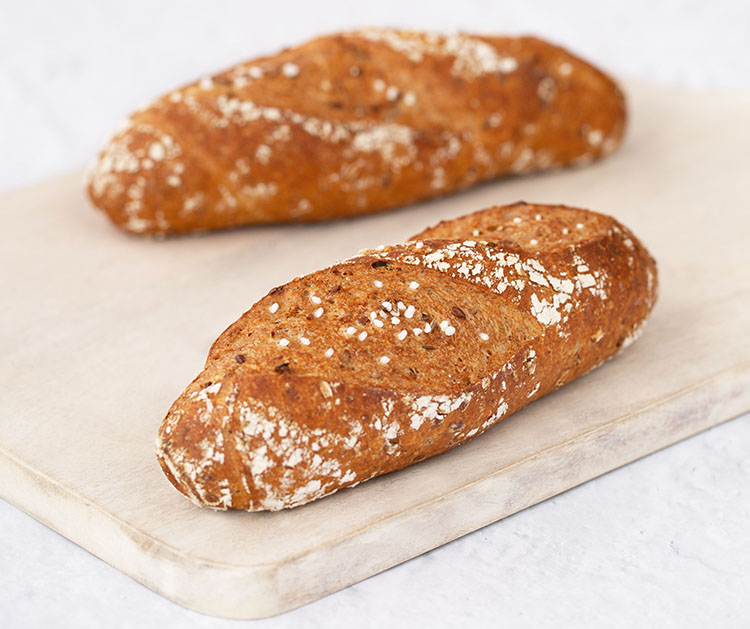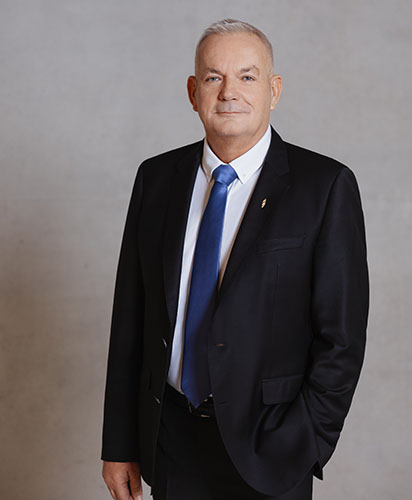
When Harald Deller started as export manager 30 years ago, backaldrin supplied bakeries in Austria and Germany. Today, he is the General Director of a company with customers in more than 150 countries and eight production facilities worldwide.
Helga Baumfalk: Mr. Deller, you have had an impressive career at backaldrin. How did you achieve this?
Harald Deller: My professional career – pun intended with my name – is a real ‘Dellerwäscher story’ (En: dishwasher). I didn’t go to university; I did an apprenticeship. Why am I emphasizing this? I want to prove to the younger generation that anything is possible. You just have to want it and do it. I have succeeded, if I may say so. Thirty years with backaldrin – I think that’s something to be proud of. Now, it’s even more important for me to prepare the future for the next generation. That’s my mission.
Baumfalk: … in your new role as General Director?
Deller: Exactly. With the decision to bring Martin Mayr and Wolfgang Mayer into the management team, the path to the future of backaldrin has been set. I will remain in office for at least another six years. My job is to prepare my colleagues for their tasks. I can look back on many years of experience, contacts, and networks – you can’t pass that on in a short time, only gradually. I continue to oversee our eight production facilities and foreign subsidiaries. I have now handed over most of my responsibilities in Asten.
Baumfalk: How important is networking for you?
Deller: Incredibly important. Networking means talking to people in a positive sense. In a globalized world, this requires getting to know and understand the mindsets of the nationalities with which you are interacting. You don’t learn that overnight.
The trick is to…
Baumfalk: To what extent are the owners, the Augendopler family, involved in your decisions?
Deller: Mr. Augendopler and I have coffee together in the morning and talk. Everything we do is unbureaucratic, with short lines of communication. Of course, there is monthly reporting, but no board meetings or anything like that. The art is, and I think we’re quite good at this, to live the spirit of a family-run private company, even as we continue to grow.
“I didn’t go to university; I did an apprenticeship. Why am I emphasizing this? I want to prove to the younger generation that anything is possible. You just have to want it and do it.”
Harald Deller, General Director, backaldrin
Baumfalk: How did you and Mr. Augendopler meet?
Deller: That’s a story written by the EU. Austria joined the EU in 1995, which completely turned the landscape of my trained profession as a freight forwarding agent upside down. I received an EU scholarship and needed an internship. backaldrin was my client, so I inquired with the company. After a month, Mr. Augendopler offered me a position at backaldrin to establish the export business.
Baumfalk: A significant undertaking. Where does one begin?
Deller: I started from scratch. My first office – and this is still a running joke in Asten today – was a converted meeting room with no windows. I had no desk, no chair, no phone. “Take care of it,” was all Mr. Augendopler said. So I got stuck in and did my job with the same determination. I know what it means to work your way up from the bottom.
Baumfalk: While preparing for our conversation, I discovered that you are originally from Styria?
Deller: From a small village in eastern Styria. My career then took me to Upper Austria. Linz became my new home, although I would like to put that in quotation marks, because actually the world was my home. I traveled a lot.
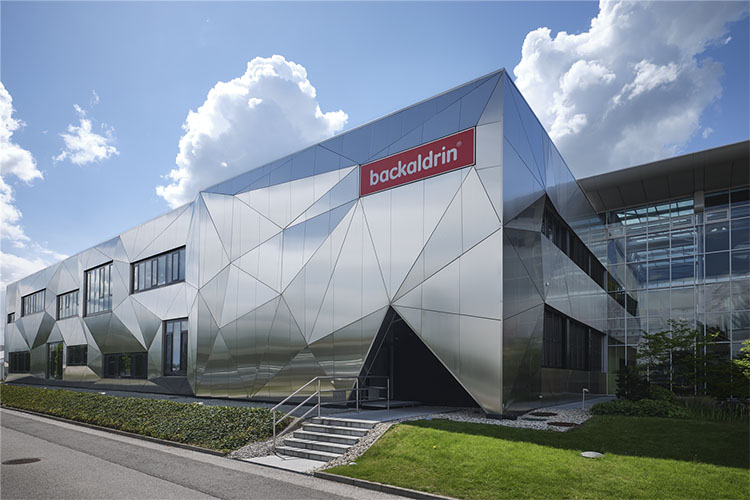
The backaldrin company
The internationally active baking ingredient manufacturer backaldrin International The Kornspitz Company GmbH has its headquarters in Asten, Austria, near Linz. The company was founded in 1964 by Peter Augendopler.
Today, backaldrin is active in 129 countries worldwide and employs around 1,000 people, 370 of whom are based in Austria. In addition to its production site in Austria, backaldrin operates seven other plants in Amman (Jordan), Winterthur (Switzerland), Toluca (Mexico), Cape Town (South Africa), Kiev (Ukraine), near Moscow (Russia), and Guangzhou (China). The company also has subsidiaries in 16 countries worldwide and is represented in many other markets through distribution partners.
The portfolio includes more than 800 products for the production of bread, small baked goods, fine baked goods, and snacks. The range includes wheat and bread baking agents, sourdoughs, special premixes for bread, pastries, fine baked goods, and confectionery, bread spices, fillings, and flavors, many of which are also available in organic quality.
Being close
Baumfalk: You have achieved a lot. Backaldrin now produces in eight countries. Why is that?
Deller: For several reasons. On the one hand, it makes no sense to transport raw materials around the planet. On the other hand, it’s because of the different mindsets of the people and bread cultures in the countries. You have to be able to play with the nuances to produce a really good product. You can’t do that from Austria. Being close to the market is the most important thing.
Baumfalk: Do the raw materials you use come from Austria or from the respective countries?
Deller: When we talk about our headquarters in Austria, we purchase all raw materials that are available in Austria for Austria. Not because we think nationally, but because we want to look our suppliers in the eye at least once a year – at harvest time. That’s our family philosophy. Our suppliers grow with us and understand what we need. The international locations naturally purchase from local markets.
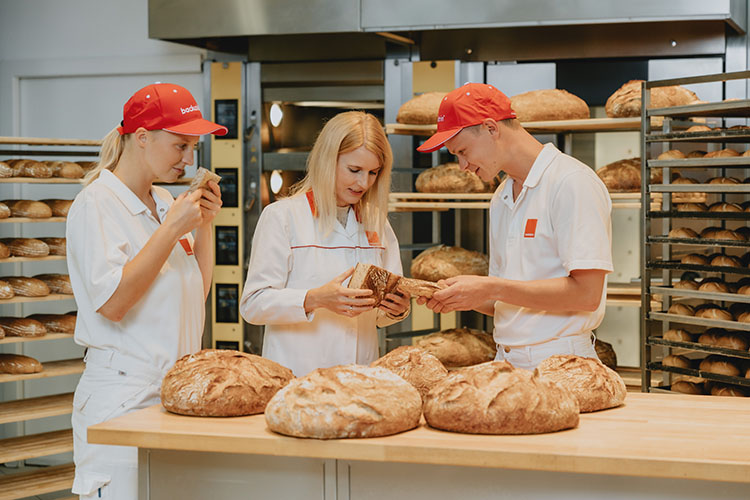
Deputy Head of Development and Quality Assurance Dr. Edith Hüttner-Wilkinson (center), together with master bakers Lea Matz and Stefan Werner, both of whom also completed their apprenticeships at the company
Baumfalk: You mentioned the different mindsets of people. How do you translate that into products?
Deller: Let me give you some examples. In the Middle East, people love sweet things. What we consider a brioche is a wheat pastry with 10% fat and 15% sugar there. While Austrians expect Kornspitz to be crispy, the Chinese
consider crispy baked goods to be stale. We need to know these things. We have to understand what consumers want. Incidentally, China is the only country where Kornspitz is called Edelweiß. No one in China could pronounce
Kornspitz.
Baumfalk: Is the topic of internationalization closed for backaldrin?
Deller: There are still plenty of blank spots on the world map. We do not force anything. Things have to develop.
“You have to be able to play with the nuances to produce a really good product. You can’t do that from Austria. Being close to the market is the most important thing.”
Harald Deller, General Director, backaldrin
Baumfalk: Where do you see blank spots?
Deller: Personally, I believe in the potential of Africa. We have a production facility in Cape Town, from where we supply southern Africa, and another in Amman, Jordan, for the North African market, but there is plenty of buffer in between. I am convinced that there is a huge future market ahead of us here.
Complaining doesn’t help
Baumfalk: The global situation has changed dramatically in just a few years. How has this affected your business and how can you respond to it?
Deller: The geopolitical changes caused by currency turbulence, tariffs, restrictions, etc. have a massive impact on every society and every business. But complaining doesn’t help. You have to respond flexibly and think optimistically about what needs to be done. Sitting back and saying everything is bad is not the way to go, in my opinion.
Baumfalk: What are currently the strongest markets for backaldrin?
Deller: Germany remains the most important market. Then comes Poland and Central Europe, where we are now firmly established. We are also strong in the Arab countries, and in South America, we have created good structures with our production in Mexico City. Regardless of this, there is still plenty for us to do, of course.
Baumfalk: How is business going in the US?
Deller: We supply the US market from Mexico. Whether this will continue to be possible in the future is out of my hands. As I said, you have to remain flexible. If I can’t deliver to the US from Mexico, then I’ll just shift my focus to South America.

That doesn’t happen often
Baumfalk: Do you bring trends from other markets to Europe?
Deller: That’s our job. You can’t change a country’s bread culture. That’s a mistake. But you can enrich the existing bread culture with new products. Everyone knows what a baguette or a croissant is today. Think of croissants with pistachio filling. Two years ago, no one knew what they were, but today the product is a huge trend in Europe. You have to offer the market innovations, that’s what it’s all about. Whether it will accept them and whether they will hold their own in the market is difficult to predict. We have proven that it can be done with our Kornspitz. The brand has been around for 40 years. We sell it in over 50 countries. Success like this doesn’t happen often. Nevertheless, you always have to try to establish new trends.
“When I meet an Austrian or German baker in Chile or Dubai, they are treated like royalty. In Europe, on the other hand, people often say, ‘What, you’re a baker?’ It’s almost unbelievable that we haven’t managed to convey how important bakers are.”
Harald Deller, General Director, backaldrin
Baumfalk: What is your view of the bakery market in Germany, Austria, and Switzerland?
Deller: I would like to draw attention to something with my answer: we must not forget how extremely good our dual training system is for bakers. As we know, a prophet is not without honor, save in his own country. When I meet an Austrian or German baker in Chile or Dubai, they are treated like royalty. In Europe, on the other hand, the reaction is often, ‘What, you’re a baker?’ It’s almost unbelievable that we haven’t managed to convey how important bakers are.
Baumfalk: How has the industry changed over the last five years?
Deller: Let me answer with some figures: in 1964, there were 470 bakeries in Vienna; in 2024, there will be 18. And now here’s the kicker: there’s still enough bread to go around. This means that the productivity of the good bakeries has increased immensely. The decline of bakeries will continue. We can’t argue that away.
The backaldrin management team
Long-standing managing director Harald Deller has been General Director of backaldrin International The Kornspitz Company GmbH since January 2025. He manages the company together with an expanded management team consisting of Martin Mayr and Wolfgang Mayer. Martin Mayr is responsible for finance, production, logistics, technology, and international sales support. Wolfgang Mayer remains the company spokesperson and heads the marketing, sponsorship initiatives, sustainability, and digitalization departments. His area of responsibility also includes sales activities in Austria, Germany, and Benelux.
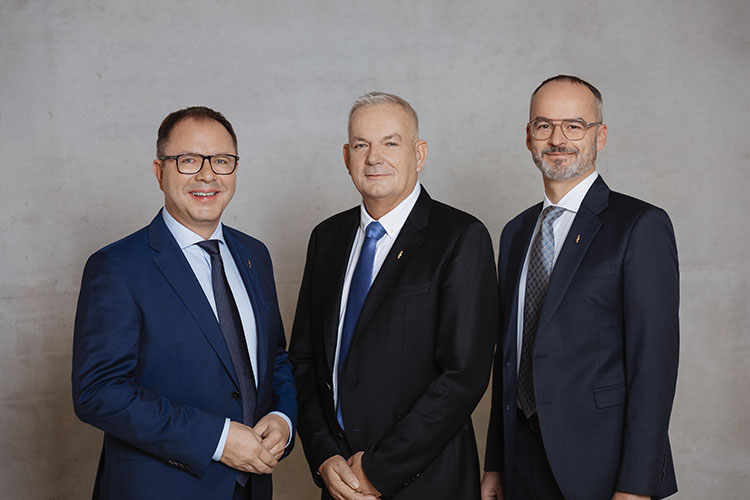
Wolfgang Mayer (left), Harald Deller (center), Martin Mayr (right)
It’s something you can’t ignore
Baumfalk: What does that mean for backaldrin?
Deller: Every customer – whether large or small – is important to us. But you can’t ignore market conditions. In Austria, 85% of bread and baked goods sales are made through food retailers. I think that says it all.
Baumfalk: How important are your master bakers for backaldrin’s sales and reputation?
Deller: They are the ambassadors and calling cards of our company. In my opinion, without master bakers, you don’t even need to bother entering the market. We have 32 master bakers working for us at our headquarters in Asten, each with master training. Internationally, there are well over 100.
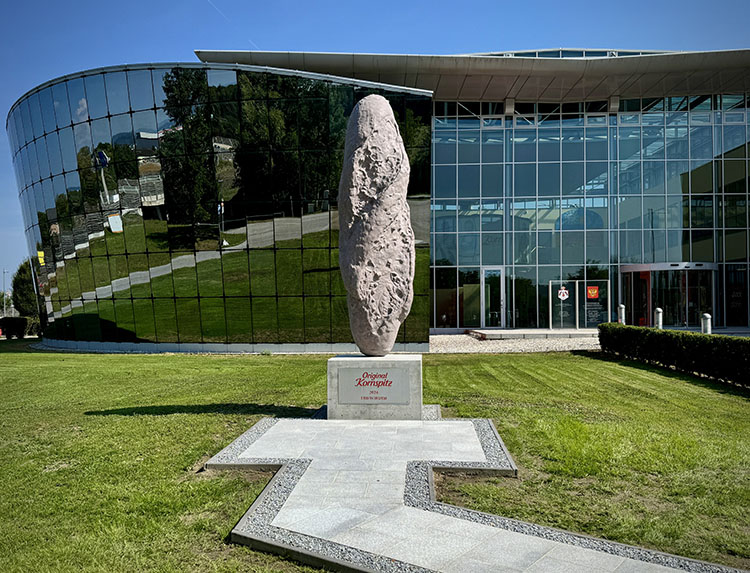
Baumfalk: Do you sometimes work with machine manufacturers?
Deller: We throw stones at each other’s gardens, but in a positive way. If you need raw materials, you need ovens, and vice versa. But we work completely neutrally and don’t set any priorities. We are backaldrin, and that’s what’s important to us.
Baumfalk: To what extent does AI play a role in your company?
Deller: Together with a university in Upper Austria, we have been working on an EU project on this topic for several years. You can’t completely ignore it, but you can consciously assess the extent to which AI makes sense. Our industry is special. Bakers have to touch the dough. If you ask me today, I wouldn’t know how AI could manage this baking touch. But again, resisting it doesn’t work.
Baumfalk: Mr. Deller, thank you for taking the time to talk to us.
